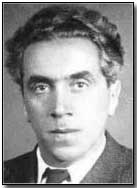Prose & Poetry - Ernst Toller
 Ernst Toller (1893-1939) served in the
German Army during World War One and subsequently published his memoirs as
I Was a German in 1933.
Ernst Toller (1893-1939) served in the
German Army during World War One and subsequently published his memoirs as
I Was a German in 1933.
Toller was born in Samotschin in 1893 and schooled at Bromberg, where he began his literary career with a series of local newspaper articles and then poetry.
In France studying at the University of Grenoble when war broke out in August 1914, Toller returned to Germany and enlisted with the First Bavarian Foot Artillery Regiment. Despatched to the Western Front in March 1915 Toller was initially pleased at the notion of being able to "do my bit" for the German cause (as he wrote in a letter home).
Initially an artillery observer Toller requested a transfer to front line duties in September 1915, feeling victimised by his platoon commander on account of his Jewish background.
In subsequent months Toller served at Bois-le-Pretre and then at Verdun. By this time his initial enthusiasm for the war had thoroughly undergone a radical change. Now shocked and appalled by the scale of carnage and the nature of mechanised warfare on the Western Front he questioned the motives of those who declared war and wondered what made a French mother any different from her German equivalent.
Suffering from illness in May 1916 Toller was evacuated to hospital in Strasbourg suffering from exhaustion and nervous stress. Thereafter transferred to Mainz he was subsequently discharged as unfit for service.
Toller determined to complete his studies at Heidelberg University where he met the sociologist Max Weber, with whom he cordially disagreed about Germany's conduct of the war: Weber argued for a continuation of the war, Toller for a negotiated settlement.
After the war Toller's life was not a comfortable one. His poetry took on a political tone and he was increasingly regarded as a dangerous political revolutionary (with some cause).
Toller was found guilty in 1919 of high treason in supporting Kurt Eisner's declaration of a Bavarian Socialist Republic and the failed Spartakist rising of January 1919. He was sentenced to five years imprisonment, during which time he continued to write poetry and a number of plays (including Transformation, The Machine Wreckers and Masses and Man). Toller was fortunate to escape the death penalty and was the beneficiary of intervention on his behalf by Max Weber and Thomas Mann.
Upon his release from prison in 1924 Toller continued to publish further works, including Once a Bourgeois Always a Bourgeois (1927) and became a prominent figure within the League for Human Rights and the Group of Revolutionary Pacifists.
With the ascent of the Nazis to power Toller's Jewish background further ensured his political alienation, already notable on account of his left-wing views. The publication of his war memoirs I Was a German - which stressed his belief in worldwide humanity over his own German nationality - was similarly anathema to those now in power. Persecution followed.
Toller was obliged to seek exile first in Britain and then in the U.S. where, after a short-lived career writing film scripts (of which only one, Hangmen Also Die, was produced) he committed suicide in New York on 22 May 1939.
The Russian war ace Alexander Kozakov claimed 20 victories during the war; his nearest compatriot, Vasili Yanchenko, claimed 16.
- Did you know?
